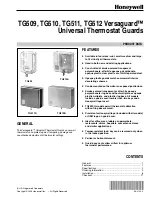
Events
Number
Severity
Description/Recommended actions
1
Warning
The disk group is online but cannot tolerate another disk failure.
•
If the indicated disk group is RAID 6, it is operating with degraded health due to the failure of two disks.
•
If the indicated disk group is not RAID 6, it is operating with degraded health due to the failure of one disk.
If a spare of the proper type and size is present, that spare is used to automatically reconstruct the disk group.
Events 9 and 37 are logged to indicate this. For linear disk groups, if no usable spare disk is present, but an
available disk of the proper type and size is present and the dynamic spares feature is enabled, that disk is
used to automatically reconstruct the disk group and event 37 is logged.
Recommended actions:
•
If event 37 was not logged, a spare of the proper type and size was not available for reconstruction.
Replace the failed disk with one of the same type and the same or greater capacity and, if necessary,
designate it as a spare. Confirm this by checking that events 9 and 37 are logged.
– If reconstruction automatically started and event 37 was logged, replace the failed disk and configure
the replacement as a dedicated (linear only) or global spare for future use.
•
For continued optimum I/O performance, the replacement disk should have the same or better
performance.
•
Confirm that all failed disks have been replaced and that there are sufficient spare disks configured for
future use.
3
Error
The indicated disk group went offline.
One disk failed for RAID 0 or NRAID, three disks failed for RAID 6, or two disks failed for other RAID levels. The
disk group cannot be reconstructed. This is not a normal status for a disk group unless you have done a
manual dequarantine.
For virtual disk groups in the Performance tier, when a disk failure occurs the data in the disk group that uses
that disk will be automatically migrated to another available disk group if space is available, so no user data is
lost. Data will be lost only if multiple disk failures occur in rapid succession so there is not enough time to
migrate the data, or if there is insufficient space to fit the data in another tier, or if failed disks are not replaced
promptly by the user.
Recommended actions:
•
The CLI
trust
command might be able to recover some of the data in the disk group. See the CLI help
for the trust command. Contact technical support for help to determine if the trust operation applies to
your situation and for help to perform it.
•
If you choose to not use the trust command, perform these steps:
– Replace the failed disk or disks. (Look for event 8 in the event log to determine which disks failed and
for advice on replacing them.)
– Delete the disk group (CLI
remove disk-groups
command).
– Re-create the disk group (CLI
add disk-group
command).
To prevent this problem in the future, use a fault-tolerant RAID level, configure one or more disks as spare
disks, and replace failed disks promptly.
4
Info.
The indicated disk had a bad block which was corrected.
Recommended actions:
•
Monitor the error trend and whether the number of errors approaches the total number of bad-block
replacements available.
6
Warning
A failure occurred during initialization of the indicated disk group. This was probably caused by the failure of a
disk drive. The initialization may have completed but the disk group probably has a status of FTDN (fault
Events and event messages
81
















































